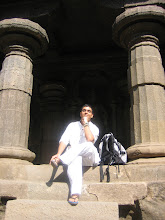Just because Sanskrit lacks a precise word for "angel"––amsara approximates the Judeo-Christian notion––the language doesn't lack for an actual angel. His name is John Clay, a businessman and lifelong devotee of Sanskrit literature who has created the Clay Sanskrit Library, copublished with New York University Press. Once completed, the series will comprise one hundred volumes, including the entire text of the Mahabhárata (in thirty-two volumes) and the Ramáyana (in eight). Each book is published in the geek-chic format made familiar by Harvard's Loeb Classical Library, with honeyed turquoise covers replacing the spartan reds and greens favored by Loeb.The New Criterion's review says:
The Clay Sanskrit Library, a marvelous new venture, grapples with these, and other, problems in a bold yet delicate manner. Modeled on the Loeb Library of Greek and Latin classics, the Clay Sanskrit Library (CSL) presents masterpieces of Sanskrit poetry, drama and prose in a dual-language format. In addition to the entire Mahabharata, one of the two national epics (it will occupy thirty-two volumes of the Library!), translation of some fifty other classical works is envisaged. The original Sanskrit (in transliteration) on the left side of the page faces the English translation on the right. Each volume includes a brief introduction to the author or work, a clear guide to Sanskrit pronunciation as well as a concise description of sandhi (that complicated system of “euphonic combination” in the script that drives beginners mad) and a “sandhi grid” (on the inside back cover of each volume), together with succinct but useful notes. The transliteration, which is at first a disappointment in place of the lovely Devanagari script, is very cleverly done to enable a beginning reader of the original to recognize the root forms of Sanskrit words. (In Devanagari script, sandhi causes the forms of final and initial letters in compounds to mutate or to fuse).There series will ultimately contain 100 volumes and includes classic Buddhist literature. Ashvaghosa, with his "Life of the Buddha" (Buddhacaritaṃ - बुद्दचरितं), and "Handsome Nanda" (Saundaranada - सौन्दरनन्द) as well as the "Heavenly Exploits" -(Divyāvadana - दिव्यावदन), a Jataka-like series of birth stories are currently available.
In the words of The Master poet Kalidasa:









No comments:
Post a Comment